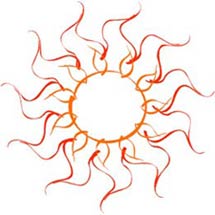He was a love child of Dagda and Boann, and carried on the tradition and became a love god, learning to play the harp and lulling the ladies with his smoochy lyrics. He seems to be the Celtic equivalent of Cupid.
To keep his reputation as a Romantic Rascal, Aonghus ran off with his step brother Midir's wife, Etain.
It is said that four doves were often seen circling Aonghus's head. These are thought to be the symbols used for kissesat the end of love letters. In one version Midir is Aonghus''s foster-father.
One tale says Aonghus tricks his father, Dagda, out of his home, the Brú na Bóinne. Aonghus arrived after Dagda had divided some of his land among his children and there was nothing left for Aonghus, so he asked his father if he could live in the Brú for a day and a nght, and Dagda agreed. But in Irish has no indefinite article, so "a day and a night" is the same as "day and night," which covers all time.
According to the Death tales of the Tuatha de Danaan, Aonghus killes his step father, Elcmar, for killinf Midir. Aonghus is also said to have killed the poet of Lugh Lamfada for lying about his brother Ogma an Cermait. The poet claimed that Ogma was having an affair with one of Lugh's wives.
To Be Continued...






